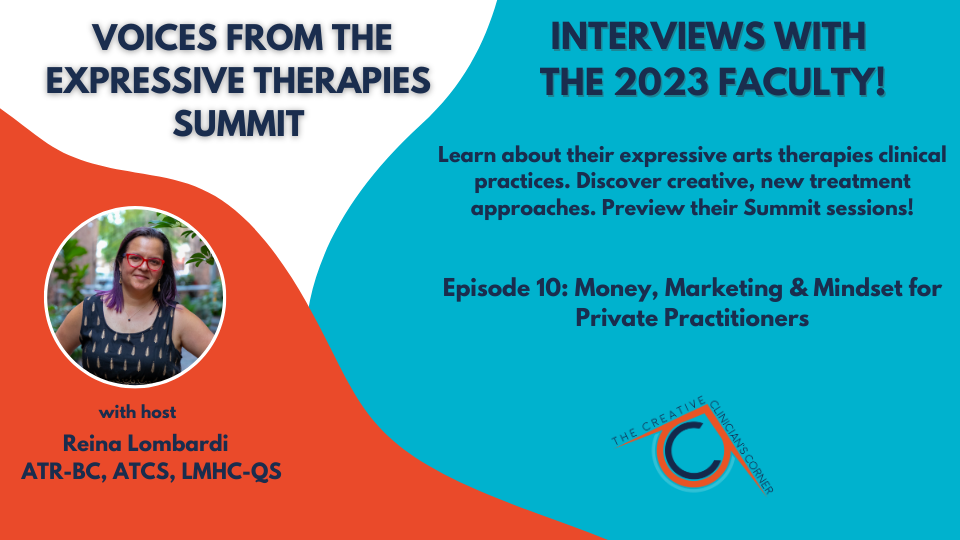VFTS 2023 10| Reina Lombardi | Money, Marketing & Mindset for Private Practitioners
FEATURED GUESTS: Reina Lombardi, ATR-BC, ATCS, LMHC-QS is a Registered Board Certified Art Therapist, Art Therapy Certified Supervisor, and Licensed Mental Health Counselor Qualified Supervisor. She owns Florida Art Therapy Services, LLC , a full-fee group practice, where she and a team of therapists provide in-person and technology facilitated individual and group art therapy and counseling services, contracted art therapy groups at various community agencies, supervision and continuing education programming for counselors and art therapists. She has contributed to several academic texts on the topics of art therapy and clinical supervision, and is a frequent presenter/speaker at local and national professional conferences. She also owns Creative Clinician’s Corner, LLC where she provides practice building resources and consultation services for creative arts therapists with a desire to build and scale their own private practice. She is the host of The Creative Psychotherapist Podcast where she interviews successful creative therapists about the tools and strategies they used to grow their dream practices, as well as how they have hustled to create additional streams of income using their knowledge and creativity by developing products and services that enhance their therapy practices.
LISTEN & LEARN:
- The benefit of addressing beliefs around money as a business owner.
- Ways to reframe marketing that align with your personal strengths.
RESOURCES MENTIONED ON THE SHOW:
- Download the free Fee Calculator here
- Listen to Leah Guzman Season 1 Episode 71 where she talks about Manifesting an Abundant Life using Creative Exercises
- Buy her book "The Art of Healing and Manifesting: Creative Exercises for Living in Abundance"
SESSIONS AT THE SUMMIT:
- Friday November 17th, 2023 2:00PM-6:00PM
- Money, Marketing & Mindset Mastery: Business Skills for a Thriving Private Practice
- While graduate schools prepare us to provide clinical treatment, they rarely teach the necessary skills for launching and building a solo or group clinical practice. This didactic & experiential 4-hour session is for you if you are preparing to launch your own practice, are new to the world of private practice, or struggling to survive as a practice owner. Attention will be given to understanding the clinical relevance of having a "money mindset" in private practice, how to calculate your desired income, as well as set your schedule and fees, based on your expense estimate. Participants will engage in experiential activities to empower themselves with an ethical system for fee setting so that they may serve their clients at the highest level without burning out — plus have the ability to take time off without financial risk. We will engage in creative exploration around "money stories" so that participants can create financially solvent practices while being able to offer accessible care should they decide to do so. Marketing is another essential skill that is important to develop — especially if you don't already have a long list of potential clients — and it's an activity that is likely the most intimidating aspect of practice building for most. Creative values-aligned marketing strategies will be presented and — since we're therapists, after all — how to determine which strategy might fit best with your personality style so that it feels natural and authentic. Participants will leave the session with a realistic sense of what it takes to get started (and be successful) in private practice, along with practical guidelines and tools to get them headed on their practice-building journey.
- ART SUPPLY LIST for the summit session above
Hey there creatives, I'm your host, Reina Lombardi and I am going to switch it up today and I'm
recording a new solo episode and it's specifically for the voices from the Expressive Therapy Summit series.
I'm going to be doing a four hour workshop on November 17th. It's online from 2 to 6 p.m.
Eastern Standard Time so you can attend from anywhere. And the topic of the workshop is going to be
money, marketing and mindset mastery, business skills for a thriving private practice.
And I've been teaching on private practice at the summit for a number of years.
It was I think one of the things that led me to want to expand and create this podcast and create some of the other
offers that I provide different consultation services, the business mastermind group that I run
every spring. Because I love helping other people to find success in their own way, whatever that
means to them. But what I've encountered is that these three things frequently come up and
create challenges to creating a successful stable profitable practice. And those things are
important in order to create high quality of life. And so I wanted to switch up what I was doing
where historically I've offered kind of a basic A to Z how to get started in private practice.
I wanted to switch it up and do something a little bit different that really addresses some of the
challenges that relate to business and operating your business. So that's what I would be talking a
little bit about today is kind of a teaser to what we'll be doing on the 17th. And so let's go ahead
and get started. The Creative Psychotherapist is the official podcast of the Creative Clinicians
Corner, a practice building resource for creative psychotherapists. TCP podcast is the cast for
creative, expressive and experiential focused psychotherapists. Curious to learn how to design,
build and scale a thriving private practice. Your host, Raina Lombardi, interviews successful
therapists about the tools and strategies they have used to develop creative focused practices.
They also talk about the products, services and side hustles they have developed using their
knowledge and creativity to enhance their therapy practices, make a greater impact in their
communities and diversify their income streams. Welcome. Now here's your host, Raina Lombardi.
All right everybody, thanks for tuning in today. The first thing that I wanted to talk with you
about is mindset. Why is mindset so important when it comes to business?
I think that it truly has a direct impact on our ability to take actions in business that are necessary but also feel very
uncomfortable. Two of the things that I've learned over the years and talking with other people and
mentoring other people as they develop their own practice is that money and marketing are two
main challenges where stuff just comes up, limiting beliefs come up, discomfort comes up in terms
of taking action, discomfort comes up in terms of visibility and discomfort comes up in
charging a fee that you have to command in order to pay yourself and sustain the operations cost
of doing business. Sometimes it's easy to look and think like, "Oh, that's their hourly rate."
That's what they're making per hour but that's not the case at all because your fee is broken down
and redistributed to and allocated to multiple different things that are required to operate your
business and market your business, sustain your business and also needs to cover your salary and
any benefits that you're giving to yourself. That can feel really difficult. Most therapists, I think,
go into this with the intent on helping other people, overcoming barriers, helping people to
have access and finances are one of the big barriers to access of care and so it can feel really
uncomfortable to charge a fee that is necessary to cover all the things that you need it to cover.
Sometimes there's fears around it. I've heard people say, "Well, people in this community can't afford
that." Well, according to who and where did you get that information? Did somebody do a study?
Is there some statistical research that supports that conclusion? How are you deriving that information?
I think just telling oneself that or believing that to be based on experience that you've had,
if you've been working in a community mental health based system, it's easy to think like,
"Well, this is the demographic of the community and they certainly can't afford it, so
therefore everyone in the community can't afford it." That is not exactly true.
I think that there are ways that as therapists we can do both when it comes to fee setting. We can set a fee that is
fair, reasonable and covers what you need it to cover. Well, still providing access and opportunities
for care for folks that may not necessarily have the means to access your services. That means
really doing a lot of creative out-of-the-box thinking, which I think as creative arts therapists,
we're all very capable of doing, especially if we use our superpower, which is our creative
ability and imagination to explore and tap into different avenues of resources within our community,
collaborating with other programs within our community, finding other programs that believe in
the work that we do and offer and will pay for their clients to have us provide this specific service
to them to getting grants. There's all kinds of ways to do it. The other thing is, maybe you are
limited in terms of resources or maybe the resources in your community are really tapped out.
Well, if you're really creating a fee structure that supports yourself and what your business needs
to take in, there's likely going to be room in there for you to offer some lower fee services
or possibly some pro bono services. But you want to keep that to a minimum and you want to do the
math in order to determine what risk your business can really take in terms of supporting that. If you're
going to be offering lowered feed or tiered feed or pro bono services. And there's formulas to do
that. I have a specific formula that I typically teach in the trainings that I offer related to
private practice. It's one of the things that I started first when I went out on my own.
I really spent a lot of time figuring out, okay, I have multiple avenues of income generation that I'm trying
to create in my business through individual therapy offerings, through supervision offerings,
through contracted groups in the community. And then different one off workshops or trainings
that I was offering. So each one of those, I had to use some kind of formula to figure out,
all right, what can I charge? What can I charge for each individual service that I'm offering
so that all of it put together generates the income that I need for both personal and the professional
business aspects. So if that's something that you're interested in, I do have that available
for download on my website. And you can get that by going to www.creativeclinicianscorner.com/b-calculator.
And that will allow you to save a copy of the fee calculator. It's a spreadsheet and it goes over
how to use it and how to come up with fees that really will support you both personally and
professionally. And I encourage you to do this periodically within your business. It's not a one
and done thing, particularly the past few years we've had an escalating cost of living around the
country. And that should reflect how you're charging your fees in your practice. So you have to do it
every once in a while review and revise and go through what your outgoing expenditures are seeing how
you can reduce those to help make adjustments to your fee schedule to keep it there and reasonable.
But it is possible. Okay. So the other thing is sometimes we struggle with charging fees or setting
fees because of our own personal history, our own money story. Maybe we grow up in a household where
we learned early on that there isn't enough money. And you can kind of hear that reflected back in
your inner dialogue or your inner critic voice or maybe that voice that kind of clicks into that
imposter syndrome part where the voice is telling you other people can't afford that or who's going to
who's going to pay you to who's going to pay you that much to to do what you're doing.
It might also come up in avoidance, right? If you notice that you're avoiding looking at your
banking account, that's a good sign that you don't have a stable relationship with your finances.
And I would encourage you to be looking at it at least once per day to make sure that you're on
top of things. And I say at least once per day just simply because of like the potential for fraudulent
charges and things like that, you can catch it quick. I know I've had my account compromised before
and it's never a fun thing. But if you're checking every day, then you're going to be on top of it.
But if you're avoiding looking at it, that's going to be problematic. If you're struggling to figure
out how to save enough money to pay your quarterly taxes and you've gotten behind, you didn't pay
and now you're on a payment plan. And now it's like it's starting to become a like a snowball,
but not a snowball in a good way, right? It starts to feel overwhelming and scary and intimidating,
thinking like I'm still paying off, you know, last year's taxes. I haven't been able to contribute
to this year's taxes. That's a that's a sign that hey, I need to do something about how I'm running
my business financially, right? No judgment, no judgment. It happens to many, many, many, many people.
It happened to me a couple of years ago where I thought I was paying enough in. I wasn't. And then I
got hit at tax time the next year and I ended up having to pay a boat load. Now fortunately,
I had been doing my due diligence with my finances to have enough saved that I was able to pay it
and not have to put myself on a payment plan. But had I not been really intentional in working
through my own money crap, I probably would have been in a real bind, in a real pickle.
And I would hate for that to happen to anybody else. So it's really important if you find yourself struggling,
it's okay. You know, don't beat yourself up over it at all. It's just an opportunity to learn some
new skills to help you. And one of the things that I would do is I would creatively explore my
relationship with money. If you have been a long time listener, I forget the episode now and I
apologize for that. But there's a wonderful episode with Leah Guzman who wrote the book, The Art
of Healing and Manifesting. And she has some really awesome creative interventions around money
that you could use to explore your relationship. I highly recommend them. They're fun. But they also
really get to the heart of the matter of like how am I viewing money?
How what is the viewpoint that I have about money? What's the stories that I'm telling myself about what it means to be a person of wealth? What does that mean if I'm maybe making some judgments about other people who have more money? What would that mean if I had that amount? Right? So you're able to kind of dive in and really get in
there and start to explore that stuff. And hopefully develop a... I don't want to use the word better,
but a different relationship with money. Because what is money anyway? It's a construct that we've created
as humans. Right? Like during different periods of time, different things have been used to
exchange for goods or services. And money is that for us today. But it's not a bad thing.
Money in itself isn't bad. And there's so many positive ways and ways and things that we can do to use our money
from a conscientious standpoint to be of service, to be of greater service. If I'm taking care of
and I'm stable financially, personally, and in my business, I am more apt to be able to create
access of care for those that would not otherwise have it. Right? So it's about changing and shifting
our relationship there. And like I said, it's okay if this is a challenging area for you,
it is for many of us. And a lot of it, I think, goes back to just our own personal fears, our personal
relationships, our beliefs around what it means to have in a society where there's so many people
that don't have. And anyway, we could talk a lot more about that.
But in the workshop that I'll be doing at the summit, we're going to be doing some creative exercises around money and exploring your relationship with money to really help you to be able to set a fee that you might feel slightly
uncomfortable with. But that is necessary to cover all of your expenses. And to be able to
feel more comfortable to look at your numbers, to deal with your numbers, to do your bookkeeping and
accounting and reconciliation. I want you to be able to have a healthy relationship with money
that fear doesn't come up when it's time for you to do payroll or when it's time for you to pay bills.
And then in terms of marketing, marketing is the other area I think that
where mindset really plays a role and has a direct impact on the health and viability of our business
because marketing is essential. It's necessary.
And I think oftentimes it's really paired with this like aggressive sales-y kind of construct or individual. I kind of used to think of it like,"Oh, it's like that creepy like used car salesperson." That it just feels so phony and inflated and
aggressive. But it doesn't have to be that way. It really doesn't. Sometimes I also think it's not
necessarily about that of like, "I don't want to be seen as that." It's just, "I don't want to be seen
or visible at all." When you think about the way we learn to be as a therapist and therapy,
we learn to really scrub a lot of our individuality from who we are in the room.
Who we are is not as important as who our clients are. We're there to witness what our clients
are going through. We're not supposed to have a lot that's visible. We're supposed to have
really strong boundaries. Somebody asks you a personal question. A lot of people are told you
don't answer that. You just reframe it back to the client and ask, "How is that going to be a benefit
to them to know that information? How is that going to influence the relationship?" Really
circumvent that. It's really about us not being visible.
I think that there's a lot of modern therapists that are changing that perspective and that are saying, "Hey, it is possible to be visible, to be myself, but also to have professional boundaries with my clients. I can reveal certain parts
without compromising the sanctity of the therapeutic relationship and still adhere to our ethical
and legal responsibilities." The reason why I'm talking about this in connection with marketing
is because marketing forces you to be a little bit more visible. If somebody who has not had to do that
and now you're forced to do that, it can be intimidating. Looking at all these folks on social media,
all the videos, some people are using humor and skits to do psychoeducation.
Some people are filming a lot of personal stuff in part to market whatever it is that they do as a
therapist. For some people that may feel really uncomfortable, what I like to do is to tell folks,
"Hey, you don't have to do all the things, but you have to find a way to connect with your ideal
clients in a climate where the costs of somebody's attention are extremely high." Think about how much
information you're bombarded with every day to grab your attention and focus in order to get you
to do something, whether that's to buy something, whether that's to go somewhere, whatever it is.
There's so much information out there that is in competition for your attention.
In order to connect with your ideal client, you have to do more than just build a website. The days of build it
and they will come are not there, folks. You have to do something that helps you connect. That might be
writing. That might be not necessarily doing videos about you per se, but it could be videos about
the creative therapeutic process that you're recording examples and providing some psych education
about what it is you're doing and how it can be beneficial. It could be blogging. It could be
oh my goodness. What else? It could be in-person networking, meeting with different
people and collaborative partners in your community on a regular basis in order to generate
appropriate types of referrals to your practice. I think that's highly beneficial.
That's one of my favorite things to do. I do some of the other things like social media, like writing, but not as
that's not my top tier marketing strategy. My top tier marketing strategy is connecting with people
in real time. That's where I feel like my strength is. I'd rather capitalize on my strength area
than put forth a ton of effort into another area where one, I'm not really sure about what the
return is going to be on that, but two, it feels uncomfortable or exhausting or difficult.
Now there is value in doing things that are difficult. I will say that. I think that's an important
part of developing your entrepreneurial skills because business forces us to do things that are
uncomfortable all the time, but that promotes growth. You're on your growing edge when you're feeling
excited, but a little bit uncomfortable at the same time. Little tangent there. Back to the whole
marketing piece, you can find something that connects with your personal strength
and use that as a tool to market as long as you're doing it consistently over time.
You don't have to invest a lot in terms of advertisements unless you want to.
For some people, it might be, you know what? I don't really want to do any of this, but I know I
need to drive business to my practice. So I'm going to hire somebody to write Google ads for me
or Facebook ads for me, and I'm going to use that as the mechanism for driving calls to my practice.
Totally fine. That might be a really wise investment of your time and money. I'm going to pay
an expert to do this for me because I don't have the skill set in order to do it.
However, if you're a little more guerrilla style like me and you don't want to invest a lot in terms of
paying to market and advertise, then there are other ways of like really that goes back to
relationship building. It goes back to understanding what your ideal client's pain point is
and designing programs and accessibility to services and additional resources that they need.
If you do that, that's going to drop people in because you're offering more than perhaps just
individual therapy. There might be other things that you can provide as well.
Like for example, maybe you work with postpartum moms and you have a group practice, then you might have a support group for postpartum moms and they can bring their children because there are other therapists there
that are going to watch their children for that hour that they're in the support group. That
would be a way of reducing the barrier that might prevent them from joining a group because they
don't have that ability to pay for childcare or have access to childcare. We can use our creative
and imaginative spirits to identify what are the things that my clients are really struggling with
aside from the fact that okay, yeah, maybe they have some anxiety or they're coping with depression,
but what's preventing them from getting in the door? Because it may not necessarily be finances,
it might be something else. Can you be creative in how you're designing your programming?
And then put that out in your marketing, right? Of like, this is for you and I've thought of you
and your specific needs of like this, this, and this. Well, that's going to already speak to that
client and they're going to go, wow, they already recognized some of the challenges that I'm feeling
and dealing with. So they're probably going to be effective at helping me move forward because
they already have a foundational understanding of my problem. So if you're struggling with marketing,
one of the things that I recommend is stretching yourself by doing a microactivity every day,
that feels like not you, right? That feels uncomfortable to do.
Maybe it is reaching out by email to a colleague in the community to say, hey, I've learned about you, I've heard about you, I really admire what I've heard. I would love to get together and meet for coffee if you feel up to it so that I
could learn a little bit more about your work and how you work with clients so that I can develop my
referral portfolio when I get clients that aren't a good fit for my practice, but I really want to have
an understanding of who I'm referring to. I want to have a warm hand off.
I don't want to just say, yeah, well, go back to your insurance. Now sometimes that is what happens, but if possible,
it's always nice to have a warm hand off. And for some people, just putting themselves out there
and making that kind of blind contact can feel really intimidating. But the more you do it,
the more comfortable you'll become. Because remember, right, discomfort isn't necessarily
about that there's something wrong. It's about our bodies unfamiliarity with the process, right? So
our body says, oh, I haven't done this before. It doesn't feel familiar. It feels uncomfortable
because I don't exactly know what I'm doing. So I was telling this like when I'm working with clients
and they're trying to change a behavior, it's going to feel uncomfortable at first. And that's okay.
How can you be compassionate and support yourself through that? And I would definitely do a similar
exercise as I had recommended with money, which is get to know the part, the voice that is coming up
when it's time for you to do some kind of marketing activity. Maybe you've put it on your calendar
to do. And then you're like, I just don't think I want to do that today and you avoid it and you
push it on to another day. What's that voice saying about what it would mean if you were to do that
activity? Get to know it, explore it. Where's it coming from? What's its historical value?
How is it protecting you? Right? When we can do these activities ourselves, it can help push us forward so much
in establishing a stable and healthy business. And a stable and healthy business is going to
help you to feel excited every day to go to work, confident and secure. Right? One of the biggest
things that people say is they feel like going into private practice isn't secure. They don't feel
like they're going to have a consistent income. They worry that they're not going to be able to
pay their bills. They worry about being able to pay for insurance and benefits and taxes and all
of those things. So yes, those are real concerns. I would never say that they're not.
And I felt worried about those two. However, when we work on our mindset in order to help us really master
our finances in our business and master our ability to drive traffic into our business,
to ensure that we're consistently bringing in the monthly revenues that we need.
Though with that, you're set. And then you can be confident. And you can feel secure. And of course,
that's what I want for all of the folks out there that are listening that are wanting to make a
change and to work for themselves and to design practices for themselves that align with their
personal values. I want you to feel secure and successful and stable so that you can live the
life that you want to live and find joy in every day, whether that is what you're doing at work or
what you're doing for play and recreation and with your family.
If you're interested in learning more from me on this topic, we're definitely going to be engaging in some experiential activities around money, marketing and mindset in this summit session on November 17th from 2 to 6 pm,
live via Zoom, interactive via Zoom. If you're interested, head on over to the Expressive Therapy
Summit website, www.expressivetherapysemit.com. From there, you're going to click on virtual summits,
and then you'll be able to click on the program for November. And you'll be able to register for that
or any of the other amazing offerings that are happening this year.
There's so many incredible opportunities for learning. I know I've had a few people on the show already this year that are going to be teaching, but there's so much more than that. So if you're looking for topics on
dance therapy, music therapy, drama therapy, psychodrama, intermodal expressive arts therapies,
art therapy, there's something there for everyone. And I've never been disappointed in any of the
learning that I've done at the summit. I love that it's interactive that we're engaging in our
way of knowing, which is through the creative and experiential process. And I love that every time
I attend something at the summit, I leave with tangible activities and experiences that will
inform the work that I do with clients and my business. So if that sounds good to you,
please do check it out. And I look forward to seeing you there. And until next time, stay creative,
everyone.











